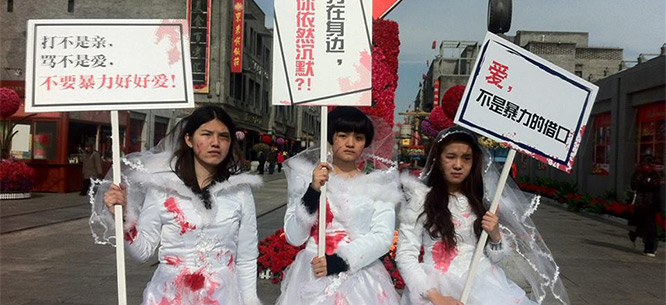China’s Feminist Five
China’s Feminist Five
China’s younger generation of feminists pose a unique threat to the Communist Party. By celebrating single, queer, and often child-free women, they are challenging government edicts that marriage and families are the foundation of the country’s political stability.

When Chinese police detained feminist activist Li Maizi on the night of March 6, 2015, they held her in a small, unheated room of a Beijing police station, with the temperature falling to below freezing. The interrogations began immediately: Why was she organizing subversive activities about sexual harassment? Who was she working with? Who funded her organization, Yirenping? Li was freezing, hungry, and angry. She refused to cooperate with the men interrogating her.
In an effort to get Li to talk, one security agent took her outside the room to show her a group of women waiting in the entrance area—they had arrested so many young feminists that night, there weren’t enough interrogation rooms for all of them in the police station.
“Those men acted like they had just won some glorious battle,” Li later told me with contempt. Li, just twenty-five at the time of her arrest, had not even contemplated the possibility that she might be detained for more than twenty-four hours just for planning to hand out stickers about sexual harassment. She and her fellow activists had done nothing to oppose the government, so she told herself, just get through this twenty-four hours, then you’ll be released. Police let some of the detained feminists go the following day, but they told Li to gather her belongings and follow them through an underground passage. More agents joined them, some in front, some behind. “I felt that the people behind me were very afraid that I would escape,” she says. “At that moment, I knew there was no way they were letting me go home.”
Li Maizi is one of five women arrested in early March 2015 for planning to commemorate International Women’s Day by handing out stickers about sexual harassment on public transportation in the Chinese capital of Beijing, the southern city of Guangzhou, and the eastern city of Hangzhou. At the time of their arrest, the women—Li Maizi (whose birth name is Li Tingting), Wei Tingting, Zheng Churan, Wu Rongrong, and Wang Man—were completely unknown outside China. Had the women not been detained, their activities marking International Women’s Day likely would have passed without much attention. Yet in cracking down on these largely anonymous young women, the Chinese government itself provided the spark for the creation of a powerful new symbol of feminist dissent against a patriarchal, authoritarian state: China’s “Feminist Five.”
News of the arrest of the Feminist Five spread swiftly around the world through the hashtag campaign #FreeTheFive, which went viral on Twitter, Instagram, and Facebook. The arrests coincided with preparations for Chinese president Xi Jinping to co-host a UN summit on women’s rights in New York to mark the twentieth anniversary of Beijing’s World Conference on Women, sparking an international outcry from rights organizations and world leaders. Hillary Clinton tweeted, “Xi hosting a meeting on women’s rights at the UN while persecuting feminists? Shameless.”
Inside the Haidian Detention Center, Li Maizi was interrogated at least once a day. For the first week, she barely said anything during these sessions and smiled sarcastically when agents asked about the friends who collaborated with her. Faced with her stubborn refusal to cooperate, the security agents tried to humiliate her. They attacked her for being lala—a lesbian—and called her a whore. “You can yell at me all you want for being a dirty woman, a prostitute, a lesbian, it doesn’t hurt me in the slightest,” Li said. After being held for about a week, Li was regularly woken up at night to scrub floors and do other types of work in the detention center. Agents outside the center began threatening Li’s parents, especially her father. They ordered him to write a letter to his incarcerated daughter, urging her to give up her activism, but Li seemed impervious to the pressure.
Then the agents took her into a special interrogation room equipped with an intensely bright spotlight, which they shone into her eyes at close range, making it impossible for her to keep her eyes open and causing tears to stream down her face. With the spotlight forcing her eyes closed, the agents accused her of being a spy for “foreign forces” (a term generally used by the Chinese state media to refer to countries such as the United States).
“What? I work on gender equality—now you’re calling me a spy?” Li said.
“You’re a spy subverting state power!” the agents said, with the spotlight bearing down on her.
At first, they said she would be sentenced to five years in jail. Seeing that Li was still relatively unfazed, the agents threatened her with an even longer jail term. “When they started talking about eight to ten years in prison, I couldn’t stay calm anymore,” says Li. “I repeated these three things every day: ‘Perseverance, bravery, endurance.’ I said this in the morning, each time I was taken out for interrogation, and before sleeping at night. I relied on this mantra to get by.”
On the thirty-seventh evening of detention, faced with tremendous global diplomatic and social media pressure, authorities finally released all five women on bail.
More than a year after their release, the women remain “criminal suspects” under investigation for the charge of “gathering a crowd to disturb public order,” an offense carrying a prison sentence of up to five years. “The political environment is very difficult now,” says Li, who lives in Beijing. “We have to think very carefully about new methods to push forward China’s feminist movement.”
During the early Communist era, the Chinese government publicly celebrated gender equality and boasted one of the biggest female workforces in the world (a strategy it employed to boost the nation’s productivity). But in the 1990s, gender inequalities deepened as China accelerated economic reforms, dismantling the Party-mandated system of equal employment for women and men. In 1990, for example, the average annual salary of an urban woman was 77.5 percent that of men, but by 2010, urban women’s average income fell to just 67.3 percent that of men, according to government data. I argue in my book, Leftover Women: The Resurgence of Gender Inequality, that Chinese women—including highly educated, upper-middle-class women—largely missed out on the biggest accumulation of residential real-estate wealth in history (worth over $30 trillion according to an analysis of figures provided by HSBC Bank) because of gendered factors, such as intense pressure on women to leave their names off property deeds and new regulatory barriers to women’s property ownership.
The reform-era media has aggressively promoted traditional gender norms. In 2007 the Chinese government began a crass campaign to stigmatize single, professional women in their late twenties, mocking them as “leftover” women in order to pressure them into marrying. But as record numbers of Chinese women attend university, both at home and abroad, they are beginning to challenge widespread sexism and unequal treatment, and more and more are identifying as feminists.
By 2012 around 100 university-educated feminists were regularly participating in performance art and activism across the country to denounce growing gender inequality driven by market reforms. They took up domestic violence (China had no specific domestic violence law in effect until 2016), sexual harassment, sex discrimination in employment and university admissions, and insufficient toilets for women—issues chosen because they were not overly politically sensitive, but relevant enough to spark public debate.
Unlike the state-sanctioned All-China Women’s Federation, which urges women to be loyal to the government, China’s younger generation of feminist activists is outside the control of the Communist Party. Under President Xi Jinping, the Chinese government has intensified efforts to wipe out many kinds of dissent—including carrying out an unprecedented crackdown on hundreds of human rights lawyers. But the feminist movement’s message of resistance to the traditional, feminine roles of wife and mother poses a unique threat to the Communist Party’s vision of a patriarchal family at the core of a strong, paternalistic state.
The feminist celebration of single, sexually non-normative, and often child-free women flies in the face of government edicts that marriage—between heterosexuals only—and family form “the basic cell of society” and are the foundation of political stability. The one-child policy may be over, but the Communist Party still views women as reproductive tools to sculpt the nation’s destiny. The latest propaganda pushes a revival of Confucian values, urging women to return to the home and have two children rather than one. As China’s birth rates plummet and its population ages, Chinese leaders believe that the very survival of the Communist Party depends on the subordination of women for social stability and to produce future generations of highly skilled workers. Yet women in China’s rapidly growing middle class (which made up 68 percent of China’s urban population in 2012, according to a study by McKinsey) are starting to reject patriarchal norms and long-held expectations of compulsory marriage.
In spite of heavy censorship, women are increasingly voicing their dissatisfaction on Chinese social media like Weibo and WeChat. In an authoritarian, one-party state like China—where citizens do not have freedom of assembly or freedom of information—it is remarkable that a critical mass of women among China’s 700 million internet users is becoming more vocal about calling out sexism, and has sometimes succeeded in pressuring the government to retract its misogynistic propaganda.
Consider the propaganda faux pas shortly after the May 2016 inauguration of Taiwan’s first female president, Tsai Ing-wen, when a Communist Party–linked newspaper published an op-ed calling President Tsai an excessively “emotional” single woman without family or children, and therefore prone to take “extremist political positions.” The op-ed was widely ridiculed by both women and men on Weibo and within a day of its publication, all Chinese media outlets were ordered to delete it because it was “inappropriate” and had a “bad influence on public opinion,” according to a leaked censorship directive.
Another member of the Feminist Five, Zheng Churan, nicknamed “Giant Rabbit,” was twenty-five when she was arrested at her home in Guangzhou in March 2015. She says the repeated interrogations during her detention were so stressful that a lot of her hair fell out. But the worst part came after her release from detention, when state security continued to call on her at her home while she suffered from post-traumatic stress. “Anytime I heard a knocking sound, I was terrified and my heart would start beating really fast,” says Zheng. “I would remember the dark, hazy images from my detention, because they had confiscated my glasses and I couldn’t see properly. After my release, I think I suffered from a kind of Stockholm Syndrome, where I tried to cater to some of the requests of the state security. I acted out this very dutiful role and censored myself constantly.”
Zheng says she began to recover from her trauma four or five months after her release, and has now regained a sense of optimism about China’s feminist movement. “The outpouring of support for us has been tremendous,” says Zheng, who is now working on ways to build solidarity between middle-class feminists and working-class women. “In this kind of political environment, the most acceptable form of feminism revolves around consumerism and elite women. This is politically safer and won’t get us arrested, but we need to come up with ways to use this trend to do something for less educated, women workers, who have very different problems.”
Although working-class women have been on the front lines of growing labor unrest in China, thus far, few if any of these women have linked their protests to a feminist cause. Any cross-class collaboration between middle-class feminists and working-class women would likely be viewed as a threat to the Communist Party, since the Communist Revolution of 1949 succeeded in part because elite Communist intellectuals joined forces with hundreds of millions of peasants and workers.
Meanwhile, one of China’s most influential feminist activists has relocated to New York to—as she put it—“open a new front” in the feminist movement, free from Chinese government interference. Lu Pin, the former chief editor of China’s preeminent feminist website Feminist Voices, was in New York to attend the UN Commission on the Status of Women just as police carried out its arrests of feminist activists in 2015. Lu Pin decided that she could do more for the beleaguered movement outside China. She was appointed a visiting scholar at Columbia University in New York in July 2015.
“Even though in the past we never openly said that we were opposed to the Communist Party, we know what the Party thinks of us now . . . we have entered the confrontational stage of the movement,” says Lu Pin, who is using her new base in New York to speak more freely than she ever could under the close monitoring of authorities in China. Another prominent male activist in the feminist movement, Lu Jun (no relation to Lu Pin), has been based in New York for several years already. Lu Jun co-founded the organization Yirenping, which employed three of the five arrested feminists. Lu Pin believes the feminist movement needs a dedicated presence outside China, so she and three partners are starting the first-ever Chinese women’s rights group based in the United States. Lu Pin hopes the group can become a valuable resource for Chinese-language information on women’s rights in China, and also raise money for feminist causes in the country.
Since the Feminist Five were arrested in 2015, a Guangzhou-based feminist activist, Xiao Meili, has worked on a domestic crowd-funding campaign for an anti-sexual harassment ad to be placed at a Guangzhou subway station later this year. Over 1,200 people within China have so far donated small amounts to the campaign, raising more than $6,000 for the ad. Although the amount raised seems small by American standards, activists say that the most important purpose of crowd-funding is to build a strong base of supporters who publicly identify themselves as committed to the feminist movement—an extraordinarily risky position to take in the current political climate.
Although many other rights activists lose their ability to tap into domestic Chinese networks once they are exiled, Lu Pin has kept up close friendships with most of China’s core feminist activists. Quoting Virginia Woolf, Lu Pin says, “As a woman I have no country.” She believes that Chinese feminists—whether in China, the United States, or elsewhere—can form alliances that cross national boundaries. “If we don’t set up this group in the U.S., China’s feminist movement will become too passive. The position of our core activists is extremely fragile and we don’t know when the police will come and arrest someone again—it could be today or tomorrow,” she says.
The Communist Party has ruled China for sixty-six years—almost as long as Communist rule in the Soviet Union. It has survived for this long because of its ability to adapt to social change and to deliver rapid economic growth to its citizens. But China’s economy has entered a protracted slowdown, just as it is beginning to face the severe demographic crises of an aging population and a shrinking workforce. More and more Chinese women are choosing to reject the traditional norms of heterosexual marriage and child rearing pushed by the Chinese state. Feminist activists in China have tapped into the broad discontent among Chinese women, which is why authorities continue to harass feminists and their colleagues and loved ones in cities across China. Yet even if all these activists are arrested or intimidated into silence, the movement they have unleashed will be difficult to stamp out.
Leta Hong Fincher is the author of Leftover Women: The Resurgence of Gender Inequality in China (Zed, 2014). She is working on a second book (forthcoming from Verso) about feminism in China.




